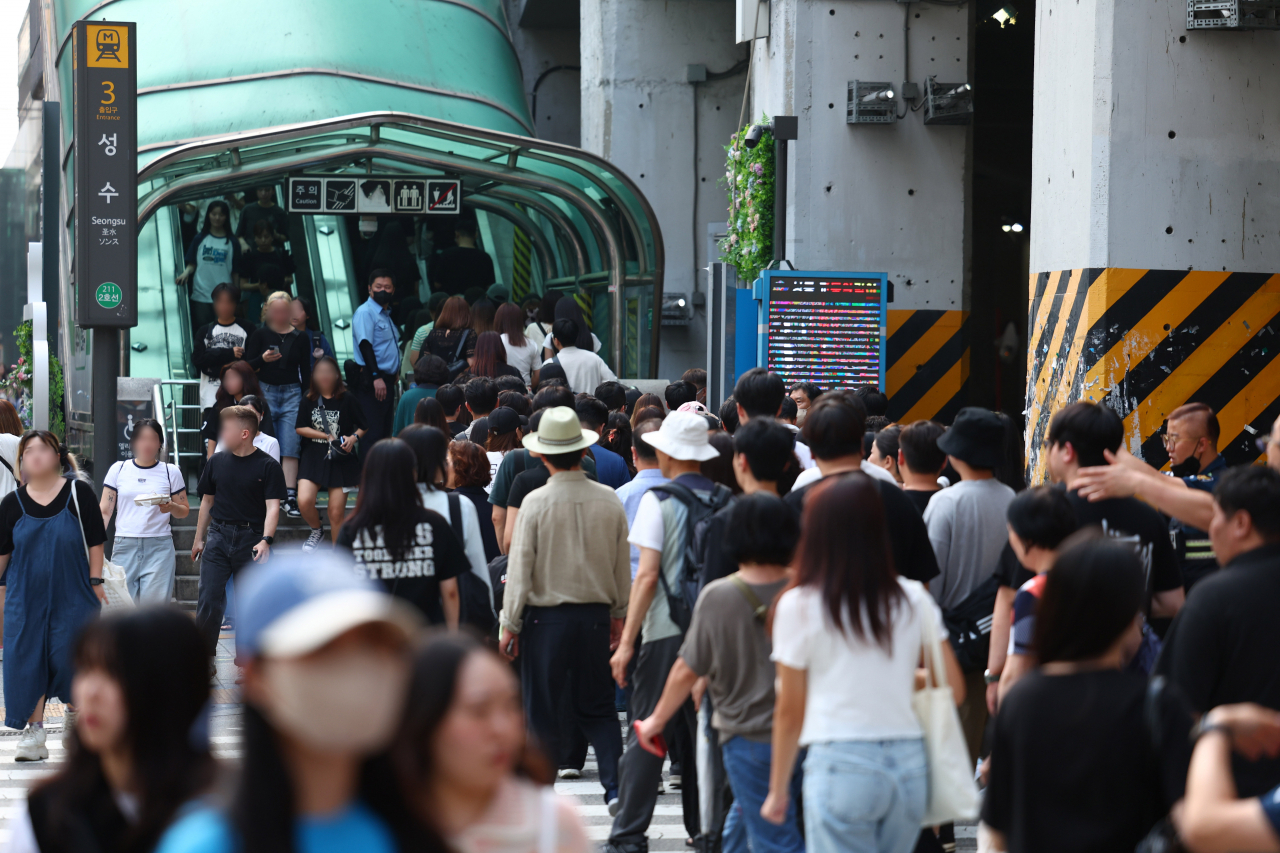 |
The name board of Jonggak Station on Subway Line No. 1 displays "Standard Chartered Bank Korea" in parenthesis after the original station name. (Newsis) |
South Korea's subway operators are raising billions of won by selling station co-naming rights to corporations, allowing them to place their names alongside the well-known station names, to make up for substantial operating losses.
Seoul Metro, the operator of Subway Line Nos. 1 through 9 within the capital, announced Aug. 12 that it had sold the co-naming rights for several subway stations, including Seongsu Station, Gangnam Station, Yeouinaru Station and Sangbong Station, through a bidding process held from July 25 to Aug. 6.
Co-naming rights to Seongsu Station and Gangnam Station were acquired by CJ Olive Young, a health and beauty retailer under CJ Group, and Haru Plant Dental Clinic for 1 billion won ($740,000) and 1.11 billion won, respectively. The co-naming rights to Yeouinaru Station sold for 222 million won, while the price for Sangbong Station was not disclosed due to confidentiality issues.
The prices for Seongsu and Gangnam stations, in particular, set new records, surpassing the previous high of 870 million won for Euljiro 3(sam)-ga Station, purchased by Shinhan Card in 2022.
Starting in October, the buyers’ names will appear not just throughout the affected stations, but across the entire metro system, including on pole signs, LED panels and in voice announcements. The contract lasts for three years, with one-third of the total payment made to the subway operator each year.
Additional revenue streams
Last year, the subway operator incurred an annual loss of 517.3 billion won despite its decision to raise the basic fare from 1,250 won to 1,400 won in August that year, which marked the first increase in eight years. Accumulated losses of the subway operator had surpassed 17 trillion won in 2021.
“Since fare increases and losses from free rides are issues the corporation cannot resolve on its own, we have expanded the station co-naming rights program since last year to generate revenue from nontransportation businesses,” said a Seoul Metro official.
Seoul Metro generated more than 4.7 billion won in revenue from the annual payments received through co-naming rights contracts in 2023 alone.
The metro operator has now contracted co-naming rights for 38 subway stations on Line Nos. 1 through 9, with the addition of Seongsu, Gangnam, Yeouinaru and Sangbong.
For similar reasons, other regional metro systems, including Korea Railroad Corp., Busan Transportation Corp. and Daegu Transportation Corp., have initiated the sales of co-naming rights for their subway stations.
Quenching thirst for brand awareness
 |
A large crowd of visitors moves in and out of Exit No. 3 at Seongsu Station on Subway Line No. 2. (Newsis) |
The naming moves have garnered significant attention spanning industries, as companies view the co-naming rights of subway stations as an effective form of outdoor advertising.
CJ Olive Young's decision to purchase the rights to Seongsu Station was part of its efforts to capture the recent rise of young and foreign visitors in the Seongsu area.
In 2023, the Seongsu area attracted more than 36 million visitors, according to government data. In the same period, Seongsu Station saw an average daily footfall of 78,018, a 14 percent increase from 67,849 the previous year.
In the first half of this year, the number of foreign visitors -- key customers for the beauty retailer -- in the Seongsu area increased more than fourfold on-year to 371,596 from 75,669.
“CJ Olive Young participated in the bidding as part of preparations for the opening of a new branch near Seongsu Station. Detailed discussions are ongoing with Seoul Metro,” a CJ Olive Young official said. In addition to the planned opening of a new branch later this year, the company already operates four branches in the Seongsu area.
Medical providers and universities that have purchased co-naming rights to subway stations in Seoul shared similar views on their effectiveness.
“We believed that having our school’s name announced in station broadcasts and displayed on subway maps would enhance our promotional efforts. We viewed this as a valuable marketing opportunity,” said an official from Shingu College, which has held the rights to Dandaeogeori Station, located near the school in Seongnam, Gyeonggi Province, since 2016.
Public vs. private interests
However, the initiative to commercialize co-naming rights to subway stations has sparked controversy, with concerns that allowing private interests to influence the naming of a public good like the subway system could undermine its public nature.
“The subway is a public asset, but under the metro's current approach, it risks becoming a promotional tool for private companies," said Kim Woo-cheol, a professor of tax accounting at the University of Seoul. "Beyond fare adjustments, there also need to be changes in policies like free rides for seniors to address deficit reduction.”
Park Min-hee, 42, a Seoul resident living near a subway station where co-naming rights were sold to a nearby ophthalmology clinic in 2022, echoed a similar sentiment, "Displaying the names of entities less relevant to the local community on the name boards of subway stations feels as if it harms the identity and culture of the region."
To address growing concerns about whether the co-naming rights sales initiative serves the public interest, Seoul Metro restricted participation in its July bidding announcement to entities with business offices located within 1 kilometer of the designated station and absent of concerns about public morals.
“We are reviewing the introduction of stricter standards for next year’s program to ensure public interest is not compromised and that the regional identity is preserved,” the Seoul Metro official added.






![[Today’s K-pop] Blackpink’s Jennie, Lisa invited to Coachella as solo acts](http://res.heraldm.com/phpwas/restmb_idxmake.php?idx=644&simg=/content/image/2024/11/21/20241121050099_0.jpg)
